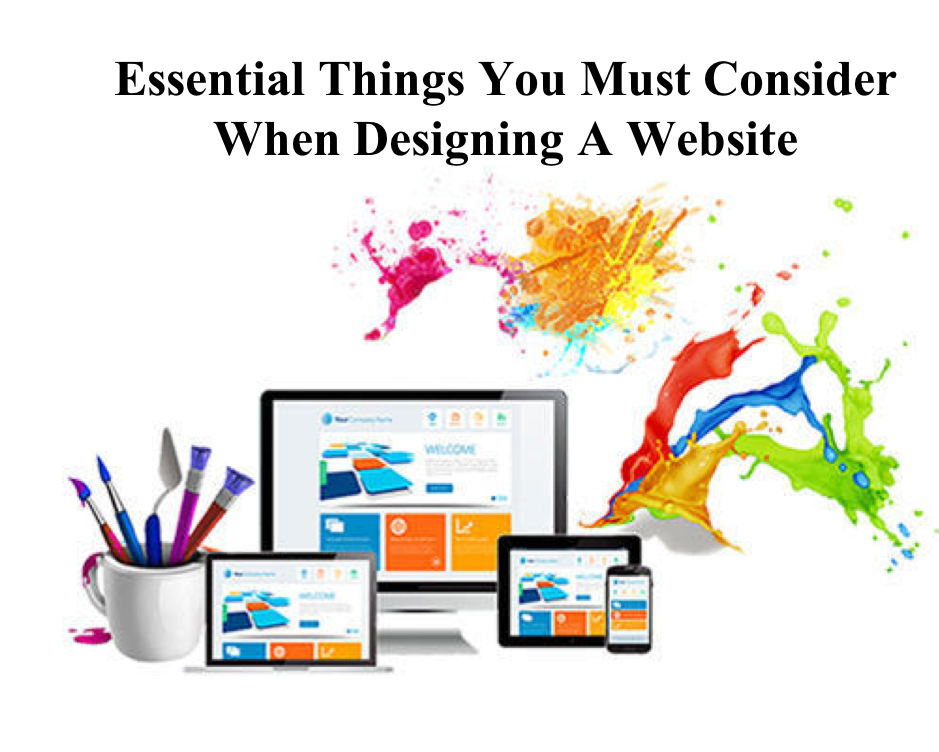Websites are an effective marketing tool for any kind of company. You can’t afford to overlook about architecture with so much competition out there. But, considering that most of us are not trained web designers, it can be hard to know where to begin the web designing. Following are 5 important things you must consider when designing a website to tell you more.
Things to consider when designing a website

Your Audience
Before you designing a website, you have to know who’s going to use it. If your website is already set up, you should have some kind of analytics that will shed more light on your audiences. For startups, you’re going to need to create a target audience from scratch and customise what you develop to fit that. Find a web designer near you.
SEE ALSO: 20 Useful Technological Wonders For Your Home
But it is also important to note that the breakdown of audiences goes well beyond gender and age alone. Marketers also think the likes of profits, personal preferences and styles of personality while creating a brand narrative. By concentrating not just on your target audience but also on your potential customers, you will design a more effective website in response.
The Purpose
Every website needs to have a specific objective. Even if your site is just a promotional tool for your company, you still have to determine what your consumers will do about it. Is the aim, for example, to get people to call you or to get people to shop with you directly? What material do you need to be able to make this happen?
Identifying what functions you need will form the design and development process of your website. Not all platforms will suit your needs, particularly if you’re going down the eCommerce path, which is why it pays to be specific about your intentions. That way you can study which providers are going to give the best possible experience.
SEE ALSO: 3 Car Gadgets to Make Driving Stress less
Number Of Pages
So that Google takes your website seriously, you’re going to really need something more than a homepage. The trick is to get the right balance between saying enough and saying too much. You need to add value to and of your pages or your customer experience would suffer. So make sure you prepare your pages before you start creating your website.
Most web designers recommend that you have a minimum of 10 pages. This gives you enough space to cover who you are, what you provide, and whatever else your customers have to know. You may also add a blog section that is useful for posting extra content that doesn’t have a position on a particular page. Note, you can always add or remove pages as needed depending on the user’s request.
The Design
Web design is not for the faint-hearted. After all the design you come up with is going to be the digital face of your company. Many website builders will bind their customers by telling them that their website can be designed in a matter of minutes. But what they’re not telling you is that it takes a lot longer than that to do it right. Navigation can take hours to find out, particularly with the likes of web menus that need to be generated with logical precision.
If you’re not familiar with the new web design practises, it’s worth hiring a competent web designer instead. Although it would cost more than trying it yourself, a poorly built website will be much more expensive to your company in the long run. First impressions matter, so make sure your guests are blown away by leaving the design to somebody who knows what they’re doing.
SEE ALSO: 7 Life-Changing Technologies Upcoming in Next 5 Years
The Content
All content on your website will need to be produced from scratch. It’s not enough to write your headings as you go or just stick to what you’ve had on your last website. SEO plays a huge role here as unless text and image content are optimised correctly, your site will soon be ranked in the search engine results.
If you have a doubt, consult a professional copywriter or a marketing agency. You need to be researching these elements yourself, at the very least.You have to study these concepts yourself. Your content must be concise, insightful and something that eventually interacts with your guests to keep them around.
Conclusion
Do not let initial enthusiasm of making a new website divert you from the subject at hand. If your website is not well built, easily navigable and full of valuable content, your customers will soon be going elsewhere. That’s why you need to spend some time planning just what you want to do with your new website design before you jump in. Your audience and target must be at the forefront of your responses to ensure a good outcome.






